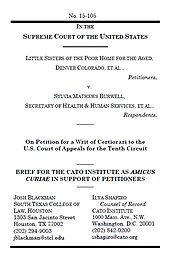Little Sisters of the Poor v. Burwell
Learn more about Cato’s Amicus Briefs Program.
Obamacare imposes a requirement that employers provide insurance that covers “preventive care” for women, but did not specify what that entails. The Department of Health & Human Services (HHS) determined that “preventive care” includes all FDA-approved contraceptives, from condoms to the morning-after pill. While houses of worship were exempted outright from the mandate, other religious orders were not. (And, as we know from the Hobby Lobby case, for-profit employers who object to certain forms of contraceptive don’t have to pay to cover them.) Instead, under an “accommodation” created by HHS and the Departments of Labor and Treasury, an objecting religious organization isn’t required to pay for the offending contraceptives, but they do have to notify HHS, which then modifies their insurance contracts so their insurers cover the objected-to items. Even though the religious organizations are not paying for the contraceptives, groups like the Little Sisters of the Poor—an order of nuns who provide various kinds of social services—still feel complicit in sin and claim that their free exercise of religion has been burdened. Cato and law professor Josh Blackman (who recently became a Cato adjunct scholar) have filed an amicus brief supporting the Little Sisters’ request that the Supreme Court hear their case. The Little Sisters raise claims under the First Amendment and the Religious Freedom Restoration Act. Our brief asks the Court to consider a supplemental question: Whether the Departments have the interpretive authority and “expertise” to resolve this “major question” of profound social, “economic and political significance”—to quote Chief Justice Roberts’s majority opinion in King v. Burwell (where he said that courts couldn’t defer to the IRS on the important question presented there). Congress gave absolutely no indication that it delegated to federal agencies the authority to decide which religious groups would be exempted and which could have their religious liberty burdened under an accommodation, or for that matter, how agencies were to design any accommodations. To quote another recent case where the Court refused to defer to an administrative agency, UARG v. EPA (2014), here the agencies are “laying claim to an extravagant statutory power” affecting fundamental religious liberty interests—a power that the ACA “is not designed to grant.” If the Departments lack the interpretive authority to craft accommodations, then Hobby Lobby provides the rule of decision and the Little Sisters must be exempted from the mandate. Accordingly, the Supreme Court should consider this additional question and conclude that the Departments’ regulatory incompetence prevents them from forcing the Little Sisters to be complicit in sin.


